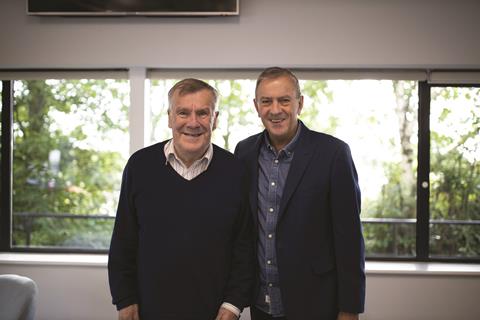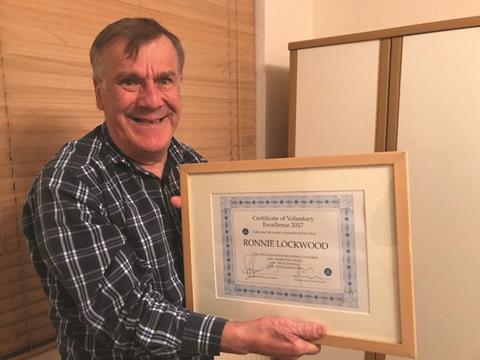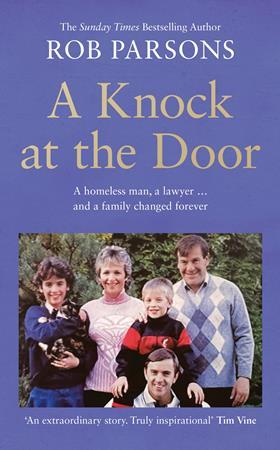When a homeless man arrived on his doorstep one Christmas, Rob Parsons never dreamed that he would stay for more than 45 years. Or that Ronnie would impact their life so significantly
Two days before Christmas and the doorbell wasn’t working properly.
I sometimes imagine how different our lives would have been if the man outside hadn’t decided to bang on the door, or we had chosen not to answer, believing it to be the return of the small boy we had generously rewarded the previous evening just to stop him murdering ‘Once in royal David’s city’.
But answer it we did.
So begins A Knock at the Door, the story of our family’s life with Ronnie Lockwood, the homeless man who stood in my porch that Christmas night. My wife, Dianne, and I invited him in and cooked him a meal. When we’d finished eating, we settled Ronnie in the living room in front of the television. Dianne gestured for me to follow her into the kitchen. “What are we going to do?” she asked. I replied: “What do you mean?” She said: “It’s Christmas. We can’t let him sleep rough tonight.”
When I went back into the living room, Ronnie was glued to Coronation Street. I said: “Dianne and I would like you to stay with us tonight. Is that OK?” He turned away briefly from the Rover’s Return and said: “Fine.”
He never left.
Ronnie lived with us for more than 45 years. He was there before we had kids and still there long after our children had flown the nest and had children of their own. He died during the Covid pandemic, aged 75.

To give and receive
Ronnie had some educational challenges and had spent much of his childhood in care, including five years in a children’s home that later gained notoriety when several of the carers were imprisoned for sexually abusing the children. One small boy who was abused on his second day there was told by a carer: “There’s no point crying – it won’t help you. And there’s no point telling anyone because nobody’s going to believe you.”
The life prospects for many children in care are poor. A quarter of homeless people have once been in the care system, as have a quarter of the adult prison population. That’s why the work of organisations such as Home for Good and Safe Families is so vital.
But tomorrow doesn’t always have to be like yesterday. One of my favourite Bible verses is from the book of Joel: “I will repay you for the years the locusts have eaten” (2:25). God did that for Ronnie. When he joined our family, he had no home, no job and a gambling addiction. By the end of his life, he had held down a job as a dustman for almost 30 years, been a volunteer at a homeless centre for a quarter of a century and become a regular volunteer at a national charity. The certificate that Care for the Family presented to him for his work there was one of his most treasured possessions.
Ronnie was there before we had kids and still there long after our children had flown the nest
But it didn’t end there. After his death, a new £1.6m wellbeing centre attached to Glenwood Church in Cardiff was named after him. The Lockwood Centre was opened by Mark Drakeford, then the first minister of Wales. He listened intently as somebody explained Ronnie’s background and life of service to others, and was visibly moved. During his speech, he mentioned something that I believe was key in helping to change Ronnie’s life: “In the story we’ve just heard, Ronnie wasn’t just the object of other people’s interest, he was somebody who gave something himself.”
As I listened to that comment, I felt as if Drakeford was echoing the words of Jesus: “It is more blessed to give than to receive” (Acts 20:35) Ronnie’s life changed not just because he received, but because he had the chance to give.
For more than 40 years I watched as opportunities came along for Ronnie to give back to others. He first grasped hold of those chances in our everyday family life. Almost from the first day he was with us, he said something that I was to hear thousands of times over the years ahead: “I’ve got a surprise for you! Guess!” He had emptied the dishwasher. The first time he asked me, I guessed right – but my success did not please him. He’d known little control in his life and the sheer pleasure of watching me trying to work it out was not one he wanted to be robbed of too quickly. So, whenever he challenged me to guess his surprise, I would go through a familiar routine: “You’ve cleared the worktops?” A shaking of his head. “You’ve tidied the chairs around the table?” A bubbling of joy at my slowness: “Try again.”
I would sigh: “Is it that you’ve brushed the floor?” Finally, unable to hold in the answer any longer, he’d fling open the dishwasher door. When you’ve been on the receiving end of the same surprise three times that week already, it’s hard to sound shocked, but I usually managed it: “You’ve emptied the dishwasher!” His face would burst into a smile that deserved to be on a sweatshirt: “I always get you, don’t I?”

Becoming family
But Ronnie’s contribution to our family became far more significant than helping in the kitchen. A Knock at the Door is not just the story of Ronnie’s life but Dianne’s and mine also. In 1980, when our daughter was three years old and we had a newborn son, our marriage hit the rocks. One day, Dianne said to me: “I’m afraid you and I are not going to make it.” At the time, I was a partner in a large provincial law practice and part of the leadership team of a growing local church. Life was busy and our disagreements were often about my putting Dianne and our family second. On one occasion, I protested that I was working hard to give our kids the things I didn’t have when I was young. I remember her reply even now: “The problem is, Rob, you’re so busy trying to give them what you didn’t have that you can’t give them what you did have.”
“What’s that supposed to mean?” I challenged.
She sighed. “Time.”
Those were dark days, but they were about to get worse. One morning Dianne woke me and asked if I could take Katie to nursery that day. And then she said seven words that changed our lives: “I don’t think I can cope anymore.”
Ronnie’s life changed not just because he received, but because he had the chance to give
All kinds of explanations were offered for Dianne’s illness, but whatever it was, her body crashed. Some days she couldn’t get out of bed. A friend suggested it was postnatal depression. Perhaps I found the experience harder than I should have, but I struggled terribly. I think there were several reasons for that. One was that, although close friends were supportive, from others in our church there was an underlying, and at times obvious, suspicion about the reality of Di’s illness. If she’d broken a leg, they’d have brought a lasagne round, but anything from the neck up was much harder for them to come to terms with. Eventually Dianne was diagnosed with myalgic encephalomyelitis (ME), also known as chronic fatigue syndrome. That was both a blessing and a curse: at least we now had a nametag on which to hang the illness, but it was also an illness that was highly controversial. Some who doubted Di all along weren’t pacified by a couple of dodgy letters: “Really? Is that an actual, medical illness?”
It was during this season that Ronnie really blossomed. He helped with the kids – making up bottles of milk, clearing up the kids’ vomit (and sometimes worse), and watching Ivor the Engine with Katie while I pushed Lloyd around the block trying to get him to sleep. When he’d first come to stay, he’d been a lodger. Then he became a friend. Suddenly, he was the brother I’d never had. Someone we both loved was ill and we were trying to get her through it together.
But family life wasn’t the only place in which Ronnie had the opportunity to give to others. Shortly after he came to live with us, he started coming to our church. It’s true that he found love and acceptance there, but he also discovered something else – the thing Drakeford put his finger on: the opportunity to give.
The power of belonging
In addition to his day job as a dustman, Ronnie became CEO of the church chair programme. In all the years that he took responsibility for putting out the chairs on a Sunday morning and stacking them away afterwards, he might have missed an odd day, but if that was the case, nobody can remember it. In an endeavour in which the helpers were often transient (students), fickle (“Sorry – can’t make it this week…”) or simply lacking in the basic requirement of strength and agility (two elderly ladies from the sewing club), Ronnie was a giant in both consistency and execution.
And he brought his special skills to the job. Just as in our kitchen he introduced an order – some would say, regimentation – to the storage of cereal packets, cutlery and crockery so, under his command, each chair was placed at exactly the same distance from its neighbour. More than one visitor to the church has been told gently but firmly by Ronnie not to mess with his layout. Rather surprisingly, Ronnie then moved into the world of finance. One day, the church member who took the collection bags around was ill and Ronnie stepped in to help. That man never got his job back.
Without doubt, church helped change Ronnie’s life
But it was not just chairs and money that occupied his time. Every Sunday evening, Ronnie washed dishes in the church’s homeless centre. After he finished his stint there one Sunday, he came home and I noticed he was wearing scruffy trainers. I asked him where his new shoes were, and he blushed, unsure if I’d be cross or proud of him. “I gave them to a man who needed them more than me,” he said. I smiled. I was proud of him, and the thought of a homeless man literally walking around in Ronnie’s shoes was too ironic for words.
The people at our church made Ronnie feel one of their own, and he came to believe he belonged there. Of course, it wasn’t all plain sailing – not least because of his habit of showing friendship by jokingly putting people in a headlock. He showed no favouritism in his selection of victims, but he had no idea of his own strength. I’ve seen Oxford professors and burly builders gasping for breath. A psychologist suggested to me recently that this may have been Ronnie’s way of connecting – perhaps, even, of experiencing touch.
I didn’t write A Knock at the Door primarily for a Christian audience, but I believe it gives testimony to the incredible power of the local church. Churches can have plenty of faults – ours was no exception – and there are many reasons why people choose not to be part of one. I sometimes meet people who are heavily involved in Christian ministry – perhaps working in a parachurch organisation – but who have stopped attending church; that saddens me. Without doubt, it was the fragile (if, at times, downright frustrating) organism that helped change Ronnie’s life.
When he’d first come to stay, he’d been a lodger. Then he became a friend. Suddenly, he was the brother I’d never had

At the end of the book is a postscript. It records the fact that, as the building work on the new wellbeing centre was coming to an end, a problem was discovered with the roof connecting it to the old building. Glenwood is not a wealthy church and there was nothing in the budget to pay the £40,000 needed. But, by the grace of God, the members need not have worried: it was, almost to the penny, the amount that Ronnie left to the church in his will.
In the end he had a surprise up his sleeve for all of us.
A Knock At The Door by Rob Parsons (William Collins) is out now






































No comments yet